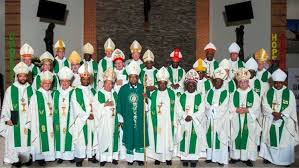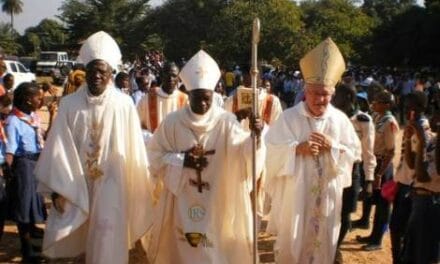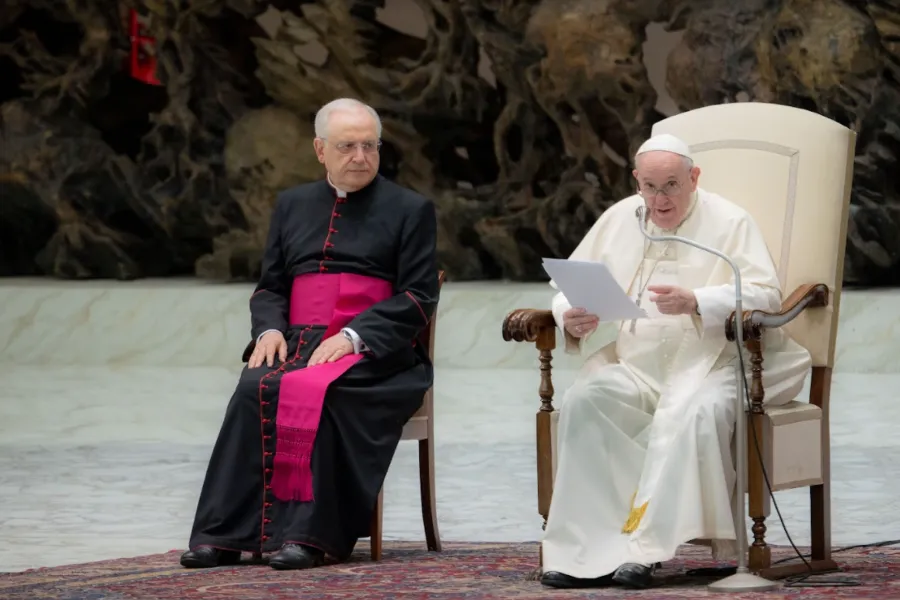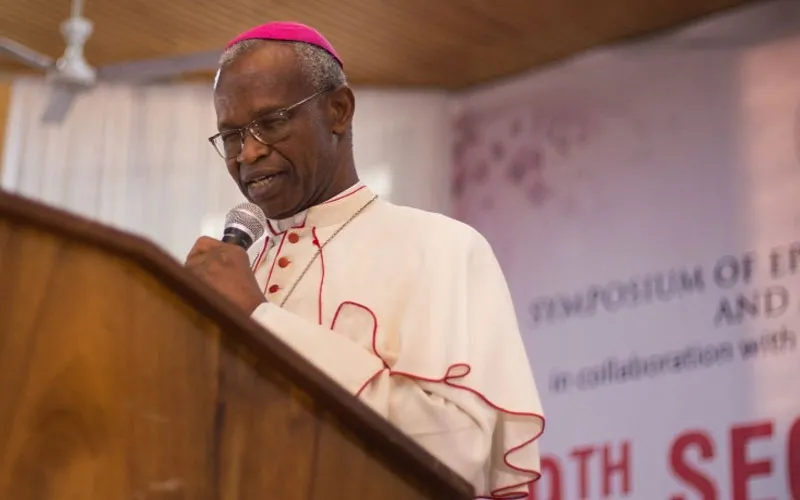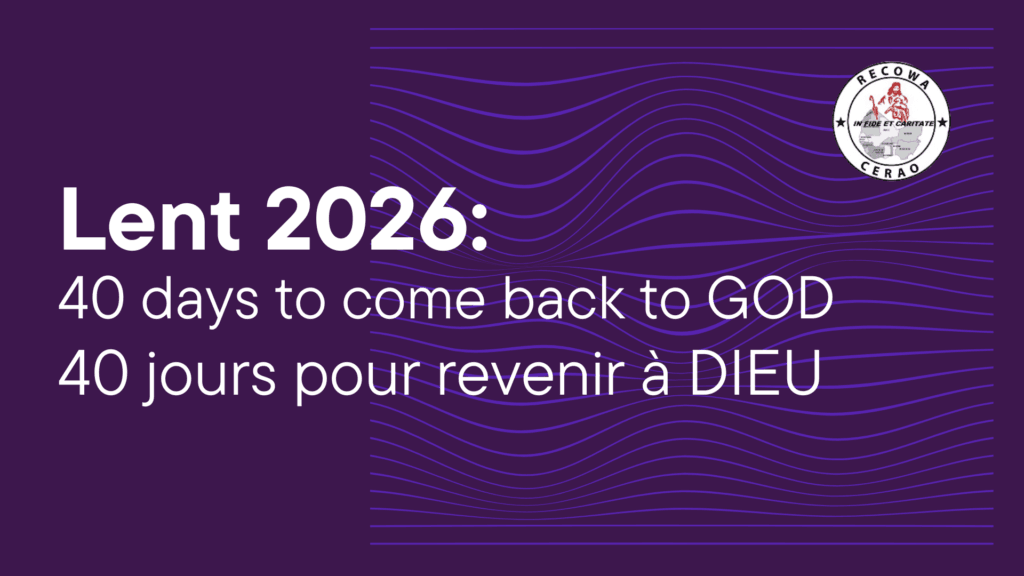On February 9 and 10, the 33rd African Union (AU) Summit was held in Addis Ababa, Ethiopia, on the theme « Silencing the Arms ».
Since 2015, the Symposium of Episcopal Conferences of Africa and Madagascar (Sceam) has been an observer of this institution. What does that mean?
The 55 member states of the African Union will meet on February 9-10 in Addis Ababa to reflect on the armed conflicts that divide many countries.
The Symposium of Episcopal Conferences of Africa and Madagascar (Sceam) obtained observer status with this continental institution in September 2015. This status was conferred upon it after the signature of a memorandum of understanding by Mgr Gabriel Mbilingi, Archbishop of Lubango (Angola), then president of the Symposium of the Episcopal Conferences of Africa and Madagascar (Sceam) and the Commissioner for Political Affairs of the African Union, Aisha Laraba Abdullahi.
AU and the Sceam
The African Union (AU) is an organization of African states created in 2002, which replaced the Organization of African Unity (OAU). Its objective is the promotion of democracy, human rights and development in Africa, in particular by the creation of a central development bank and the increase of external investments with the program of the New Partnership for the Development of Africa (NEPAD). This program considers peace and democracy to be essential prerequisites for sustainable development.
The Sceam, meanwhile, was born out of the need, after Vatican Council II, of the African episcopate to speak with one voice. Seeing the importance of such an association for Africa, the Congregation for the Evangelization of Peoples invited the presidents of the regional episcopal conferences for a consultation in 1968. One year later, on the occasion of the very first visit of the Pope Paul VI in Africa – from July 31 to August 2, 1969 in Uganda – the Symposium of Episcopal Conferences of Africa and Madagascar was launched.
What are they committed to?
On the basis of the protocol signed in September 2015, the African Union and the Sceam undertake to consult each other and to prepare cooperation programs; to send observers to meetings of their respective bodies dealing with matters of common interest; to cooperate to achieve their specific objectives at national, continental and international level and to organize seminars or the dissemination of reports. In financial terms, the African Union and Sceam undertake to seek funds for joint activities for the benefit of the entire African continent.
African bishops and their commitment.
The observer status granted to Sceam came in a context in which the African episcopates were increasingly involved in the socio-political life of their respective countries, not hesitating to challenge the leaders on their responsibility. The pioneer country in this area was DR-Congo, whose episcopate helped dissuade former President Joseph Kabila from running for a third term. But in recent weeks, the Togolese and Ivorian bishops have distinguished themselves by taking positions in the socio-political field.
Xxxx
Il y a eu beaucoup de questions sur les activités de nos évêques africains dans le monde social. RECOWACERAO NEWS a pris le temps d’étudier certaines des percées faites par nos évêques africains dans le passé et beaucoup en cours actuellement. Notre équipe de News qui, du 10 au 13 novembre 2004, marque l’ouverture du premier symposium des évêques africains et européens, organisé par le Conseil des conférences épiscopales européennes (CCEE) et les conférences épiscopales d’Afrique et de Madagascar (SECAM), à Rome. Mgr Amédée Grab, évêque de Coire en Suisse, et président du CCEE, Rome, Vatican ont été nommés.
Les 9 et 10 février, se tient à Addis-Abeba, en Éthiopie, le 33e sommet de l’Union africaine (UA) sur le thème : « faire taire les armes ».
Depuis 2015, le Symposium des Conférences épiscopales d’Afrique et Madagascar (Sceam) est observateur de cette institution. Qu’est-ce que cela signifie ?
Les 55 États membres de l’Union africaine se réunissent ces 9 et 10 février à Addis-Abeba où ils réfléchiront sur les conflits armés qui divisent de nombreux pays.
Le Symposium des Conférences épiscopales d’Afrique et de Madagascar (Sceam) a obtenu le statut d’observateur auprès de cette institution continentale en septembre 2015. Ce statut lui a été conféré après la signature d’un protocole d’accord par Mgr Gabriel Mbilingi, archevêque de Lubango (Angola), alors président du Symposium des Conférences épiscopales d’Afrique et de Madagascar (Sceam) et le commissaire aux Affaires politiques de l’Union africaine, Aisha Laraba Abdullahi.
UA et le Sceam
L’Union africaine (UA) est une organisation d’États africains créée en 2002, qui a remplacé l’Organisation de l’Unité Africaine (OUA). Elle a pour objectif la promotion de la démocratie, des droits de l’homme et du développement en Afrique, notamment par la création d’une banque centrale de développement et l’augmentation des investissements extérieurs avec le programme du Nouveau partenariat pour le développement de l’Afrique (NEPAD). Ce programme considère que la paix et la démocratie sont des préalables indispensables au développement durable.
Le Sceam, quant à lui, est né du besoin, après le Concile Vatican II, de l’épiscopat africain de parler d’une seule voix. Voyant l’importance d’une telle association pour l’Afrique, la Congrégation pour l’évangélisation des peuples invita les présidents des conférences épiscopales régionales pour une consultation en 1968. Un an après, à l’occasion de la toute première visite du pape Paul VI en Afrique – du 31 juillet au 2 août 1969 en Ouganda –, le Symposium des conférences épiscopales d’Afrique et de Madagascar fut lancé.
À quoi s’engagent-ils ?
Sur la base du protocole signé en septembre 2015, l’Union africaine et le Sceam s’engagent à se consulter réciproquement et à préparer des programmes de coopération ; à envoyer des observateurs dans le cadre des rencontres de leurs organes respectifs traitant des questions d’intérêt commun ; à coopérer pour atteindre leurs objectifs spécifiques au niveau national, continental et international et pour organiser des séminaires ou la diffusion de rapports. Sur le plan financier, l’Union africaine et le Sceam s’engagent à rechercher des fonds en vue d’activités communes au profit de tout le continent africain.
Évêques africains et engagement
Le statut d’observateur accordé au Sceam est intervenu dans un contexte où les épiscopats africains s’engagent de plus en plus dans la vie sociopolitique de leurs pays respectifs n’hésitant pas à interpeller les dirigeants sur leur responsabilité. Le pays pionnier en la matière a été la RD-Congo dont l’épiscopat a contribué dissuader l’ancien président Joseph Kabila de briguer un troisième mandat. Mais ces dernières semaines, les évêques togolais et ivoiriens se sont illustrés par des prises de position dans le champ sociopolitique.
- CATHOLIC ARCHBISHOP IN GHANA HAILS POPE LEO XIV AS GOD’S GIFT - 23 mai 2025
- POPE LEO XIV TO APPROVE CANONIZATIONS - 22 mai 2025
- THE EVOLUTION OF PAPAL TRANSPORTATION - 20 mai 2025

